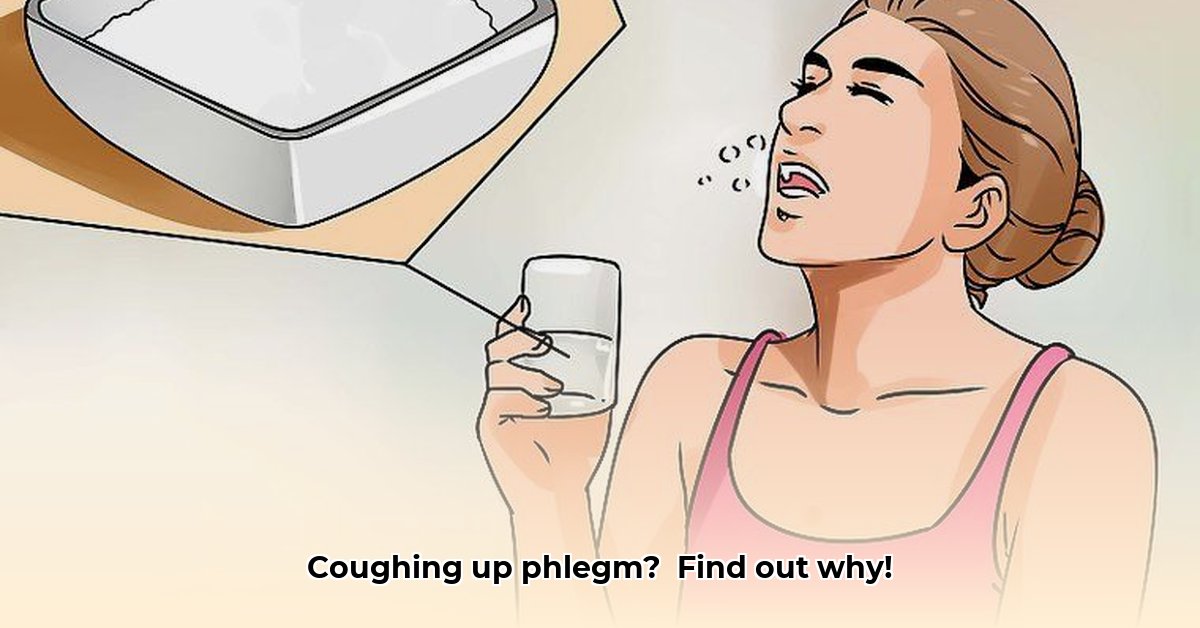
That persistent cough, bringing up phlegm (thick mucus), but without the usual cold symptoms? Jy's nie alleen nie! Lots of people experience this. Let's figure out what might be causing it and how to get some relief.
Understanding That Persistent Cough
So, you've got a cough that's producing phlegm, but no runny nose, sore throat, or other cold symptoms. What's going on? This is a common problem, and there are several possible explanations.
Why Am I Coughing Up Phlegm Without a Cold?
Think of your airways as a network of roads. Sometimes, these roads get blocked, causing congestion that leads to coughing. This congestion can stem from various factors, some minor, others more serious.
Allergies (allergies): Pollen, dust mites, pet dander – these environmental irritants can trigger inflammation in your airways, resulting in a cough and mucus production.
Postnasal Drip (postnasal drip): Excess mucus from your sinuses draining down the back of your throat can irritate your throat and cause a persistent cough.
Asthma (asma): This condition involves inflammation and narrowing of your airways, leading to coughing and difficulty breathing, often with phlegm.
GERD (Gastro-oesophageal reflux disease/GERD): Stomach acid refluxing into the oesophagus can irritate the airways and trigger a cough.
Chronic Bronchitis (kroniese brongitis): Long-term inflammation of the bronchial tubes (airways in your lungs) causes repeated infections and a persistent cough, frequently with mucus.
Other Infections (ander infeksies): Lung infections, like pneumonia, can cause a cough with phlegm, even without typical cold symptoms. A proper diagnosis is crucial here.
Environmental Irritants (omgewings irriterende stowwe): Exposure to smoke, dust, or strong chemicals can irritate your lungs, stimulating a cough with phlegm.
Remember that this isn't an exhaustive list. If your cough persists, seeing a doctor for a proper diagnosis is essential.
When Should I See a Doctor About My Cough?
A cough lasting more than three weeks warrants medical attention. Don't delay! Seek immediate help if you experience:
Coughing up blood (bloed ophoes): This is a serious sign and needs immediate medical intervention.
Shortness of breath (asemnood): Difficulty breathing is never a good sign.
Wheezing or chest tightness (pies of borskas): These indicate airway constriction.
High fever (hoë koors): A high fever often signals a more severe infection.
Significant weight loss (beduidende gewigsverlies): Unexplained weight loss coupled with a persistent cough requires investigation.
Managing Your Cough: Practical Steps
For a less severe cough, try these self-care measures:
Stay Hydrated (bly gehidreer): Drink plenty of water, juice, or herbal teas to help thin the mucus.
Rest (rus): Your body needs rest to heal. Get enough sleep.
Humidify the Air (humidifiseer die lug): Use a humidifier or a bowl of water to add moisture to the air, soothing irritated airways.
Over-the-Counter Remedies (oor-die-toonbank-middel): Over-the-counter cough medicines might help, but always follow the instructions carefully.
These are temporary measures. If your cough doesn't improve or worsens after a week or two, see a doctor.
The Importance of a Proper Diagnosis
Accurate diagnosis is key to effective treatment. Your doctor will assess your medical history, listen to your lungs, and may order tests like blood tests, chest x-rays, or lung function tests to determine the cause of your cough. Remember, seeking medical help is a sign of taking charge of your health. Early intervention improves outcomes.
Key Takeaways:
- A persistent cough without a cold can have several causes, ranging from allergies to more serious conditions.
- Paying close attention to your symptoms is vital for identifying the underlying cause. A symptom diary can be helpful.
- Don't hesitate to consult a doctor if your cough is severe, persistent, or accompanied by other concerning symptoms.
- Simple home remedies can offer temporary relief, but a proper diagnosis and treatment plan from a healthcare professional are crucial for long-term resolution. Remember, your health is important!